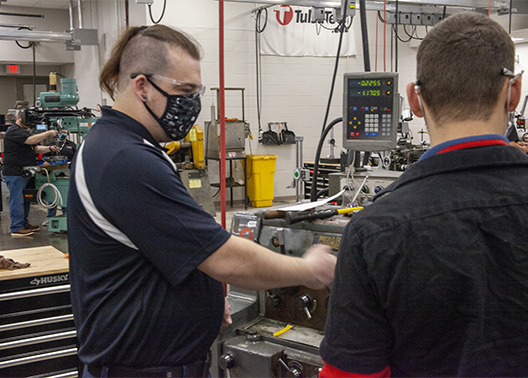Building the Path to a Skilled Workforce
January 15, 2021

When was the last time you used trigonometry? If you ask that of 2017 Tulsa Tech graduate David Patrick, he would tell you almost daily. Patrick is not boasting. It is just part of what it takes to run Computer Numerical Control or CNC machines.
“When you are making parts, you have to do the math,” Patrick said with a grin. “You can’t pretend you know what you are doing because if you make a mistake, it can cost the company a lot of money.”
Patrick works for Baker Hughes in their small parts division, making intricate pieces for proprietary safety valves. Each complicated part must meet exact specifications, and it is up to Patrick to make sure each component is right.
“Everything from the original idea to the engineering to the machining, requires layers of science and mathematics,” Patrick said. “A lot of the material that I cut are designed not to be cut, so I need to make sure my ‘feed and speed formulas’ are spot on.”
Tulsa Tech students can now learn not just the math skills, but all aspects of manufacturing in a new state-of-the-art facility. The 18,000 square foot machine and mechatronics space is the latest shining example of the world-class facilities Tulsa Tech offers students.
“I walked around the corner and saw the new shop, and I was blown away,” David Patrick, a 2017 graduate, said. “My jaw dropped; everything in here is set up just like it is at Baker Hughes.”
Students learn how to design and create high-tech precision parts in the Certified Machine Operator and Certified Machine Technician programs from manual to computer-aided machines.
“When I arrived at Tech, I was thrown into a new world, and I got a taste of everything I needed to know,” Patrick said. “Tulsa Tech prepared me to go into the workforce.”
These programs available to high school and adult students open doors to great jobs. According to the United States Bureau of Labor Statistics, the average machining career pays around $46,000. That number is even higher in Broken Arrow, with an average salary topping $60,000.
Despite his success, Patrick says he owes a lot of it to his instructor, Aaron Runk.
“Every time I run into him, I tell him ‘thank you,’” Patrick said, smiling. “When I graduated and got my job, I had to go and get him a gift card to say thanks for helping change my life.”
Patrick went on to joke that he would continue sending cards of thanks, if it would not become a nuisance. Having completed his time before the new space was opened, he was amazed by the transformation.
“The shop I learned in was awesome, but this, this is top-notch,” Patrick said. “Walking in here, I was able to see that everything from the machines to the layout and the safety requirements match what I see every day at Baker Hughes. To me, this space is all about mimicking industry.”
An accolade any institution would gladly take, especially with our mission of Educating people for success in the workplace. A mission Patrick gets to live out every day in his job at Baker Hughes.
“Being able to go into my job and be an expert, it is like being your own boss,” Patrick said. “I can’t thank Tulsa Tech enough for preparing me for this career.”
If you are looking to for a new career or want to get ahead in your current field, look no further than Tulsa Tech. With more than 80 full-time career training programs and hundreds of part-time options, we have the training to fit your needs.